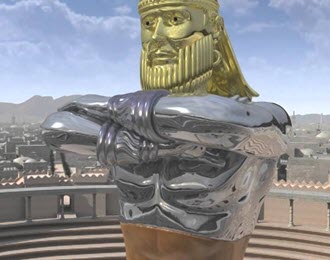The Axial Period & Babel
02-06-2025 - Posted by Geert-JanOriginally posted on November 23, 2025 - by Andre Piet
Summary of a Bible study evening held on October 7, 1999, in Katwijk a/d Rijn. A republication.
“The times of the nations” are the times when “the throne of the LORD” in Jerusalem is vacant (i.e., empty). Jerusalem is dominated by the nations. Since the Babylonian exile to the present day, this has been the case. Luke 21:24
On “the throne of the LORD,” a king from the house of David is supposed to sit. After the two-tribe kingdom was taken to Babylon, no prince from David’s house has ever reigned in Jerusalem. 1 Chronicles 29:23; Jeremiah 3:17; Psalm 89:4,5,36–38
With the liberation of Jerusalem in 1967, “the times of the nations” did not end. Still, no legitimate heir from the house of David sits there.
It is remarkable that God is called “the God of heaven” in Daniel 2:37, 44. “The throne of the LORD” is no longer in Jerusalem. From heaven, He will establish His Kingdom in due time. Think of the stone that broke off and crushed the image from above.
Nebuchadnezzar was globally dominant. This is usually dismissed as Eastern exaggeration. Nevertheless, he is called “king of kings,” the same title given to Jesus Christ! In Daniel, we read that all the children of men, wherever they dwell, were given into Nebuchadnezzar’s hand. And also that his dominion extended to the ends of the earth. This does not mean that he had conquered all other kingdoms but that they were subordinate to him. Daniel 2:37; Ezekiel 26:7; Revelation 19:16; Daniel 4:22
Nebuchadnezzar was also globally religiously dominant. He made a gigantic golden image for the worship of “all peoples, nations, and languages on earth.” The intelligentsia of Israel were taught at Nebuchadnezzar’s court “in the writings and language of the Chaldeans.” Was this his method to spiritually and religiously bring the nations under his control? Daniël 3:7; 1:4
Is this coincidence?
In the year the temple in Jerusalem was destroyed, the following were all between 30 and 50 years old:
- Confucius in China
- Buddha in India
- Zoroaster in Persia
- Thales in Greece
- Ezekiel, Daniel, and Jeremiah
The Japanese religion of Shintoism and the Hindu religion of Jainism also find their origins in the sixth century before Christ. The entire thinking of the current world goes back to “the golden head.” When the light went out in Jerusalem (departure of the Shekinah), a globally spiritual dark time periode began, which continues to our time.
Derived from Prof. Dr. W.J. Ouweneel in ‘Bible and Science’ (1999) and Drs. A. Keizer in ’the coming thirty years’.
In Ezekiel, it is described how “the glory of the LORD” (the so-called Shekinah) left the temple and settled on the Mount of Olives. And from that same Mount of Olives, this glory will, in the future days, again take up residence in the brand-new temple. Ezekiel 11:23; 43:1
The temple built after the exile under the leadership of Ezra was ‘Ichabod,’ meaning without glory. Nowhere do we read that ’the cloud’ took possession of this temple. Compared to Solomon’s temple, this temple paled in comparison. This despite the enormous embellishments made under Herod over 46 years. The second temple also lacked the most important attribute: the Ark of the Covenant. These are “the times of the nations.” Haggai 2:4; Ezra 3:12; John 2:20; Luke 21:5
According to historians, the sixth century before Christ was an ‘axial age’ in world history. An ‘axial period’ in which the intellectual and spiritual foundation was laid for the world as we know it today.
Pythagoras taught the immortality of the soul and had a decisive influence on later Greek philosophers such as Aristotle, Plato, Socrates, and others. This doctrine stands in stark contrast to the biblical teaching concerning the resurrection of the dead. When Paul begins to speak about the resurrection on the Areopagus, he has to end his speech.
Characteristic of all Babylonian thinking is the confusion of languages. Babel also means ‘confusion.’ Depriving words of their unambiguous (concordant) meaning so that people no longer understand each other. That is Babel. Genesis 11:9
Jeremiah’s prophecy radically ends an entire period. Kingdoms and nations were destroyed, devastated, uprooted, and overthrown. This happened under Nebuchadnezzar. He performed his task so thoroughly that we have to make do with scant archaeological remnants from before the sixth century before Christ. Visible memories of, for example, the immense empire of David and Solomon have almost disappeared.
“The eon of this cosmos” once began in Babel, where people wanted to make a name for themselves and build a tower. God confused humanity’s endeavor. Thousands of years later, “the times of the nations” begin, again in Babel. The current eon and “the times of the nations” will also end with a judgment over Babel, the city described in Revelation 17/18. Ephesians 2:1
Judaism in its current form also originated during the time of the exile. The time of Nebuchadnezzar, that is. During this time, synagogues emerged, and the foundation for the Talmud was laid. Remarkably, Jeremiah also announces a new covenant for the people in his prophecies, thereby declaring the existing covenant obsolete… Judaism as a religion that preserves the Sinaitic covenant was thus already outdated from its inception.

 English Blog
English Blog